Business Plan Report: Starting a Business and Marketing Fundamentals
VerifiedAdded on 2022/12/29
|8
|2553
|100
Report
AI Summary
This report presents a comprehensive business plan focusing on the introduction of Room Service Robots in the hospitality sector. It begins with an overview of the business idea, emphasizing the benefits of automation and efficiency. The report then delves into an evaluation of the external environment using PEST analysis, examining the political, economic, social, and technological factors impacting the industry. A detailed discussion of competition is provided, utilizing Porter's Five Forces to analyze competitive advantages and market dynamics. Finally, the report identifies the target market, employing the STP method to address segmentation, targeting, and positioning strategies. The analysis emphasizes the importance of understanding customer needs and preferences to effectively market the service. The report concludes by highlighting key findings and implications for the business plan's success.
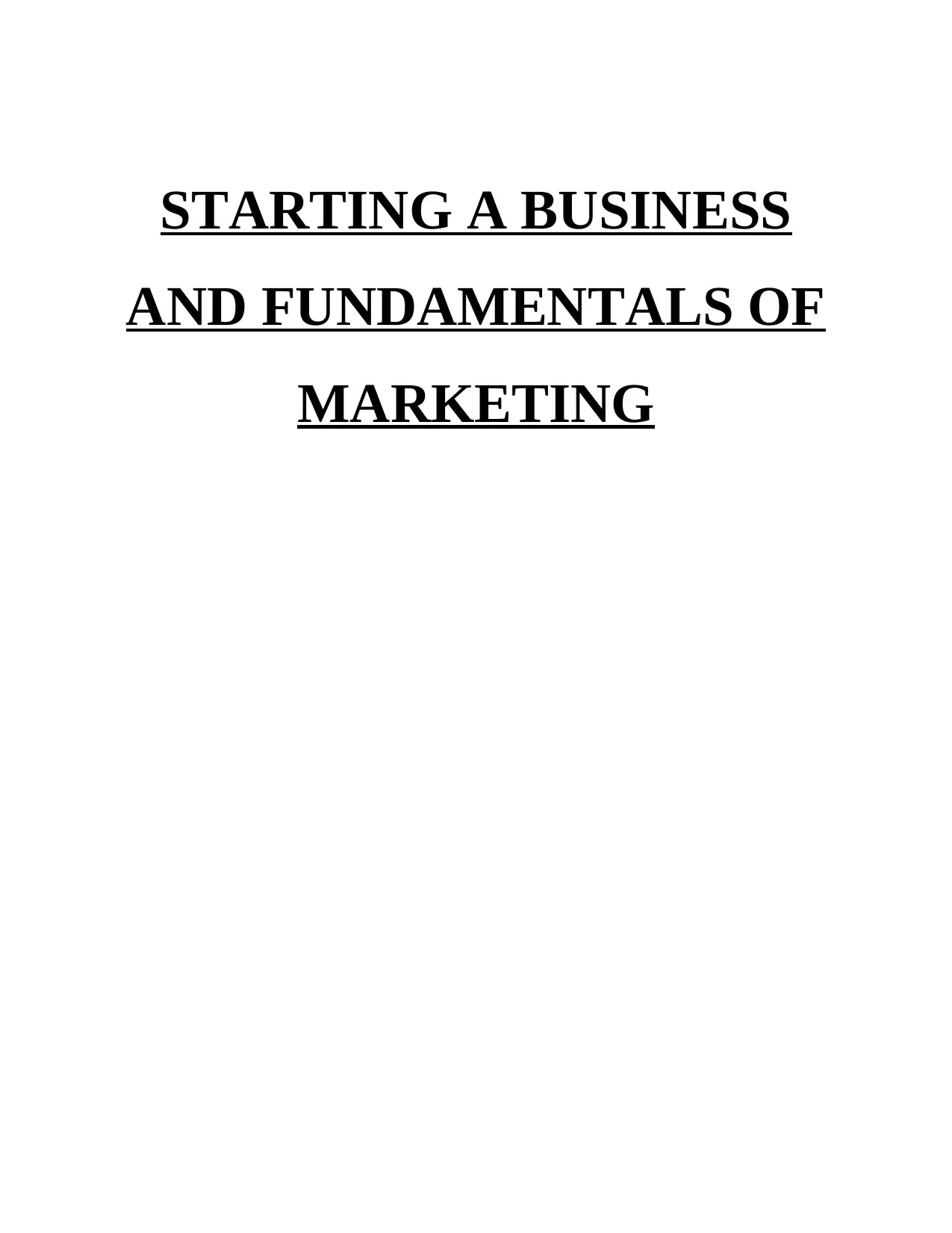
STARTING A BUSINESS
AND FUNDAMENTALS OF
MARKETING
AND FUNDAMENTALS OF
MARKETING
Paraphrase This Document
Need a fresh take? Get an instant paraphrase of this document with our AI Paraphraser
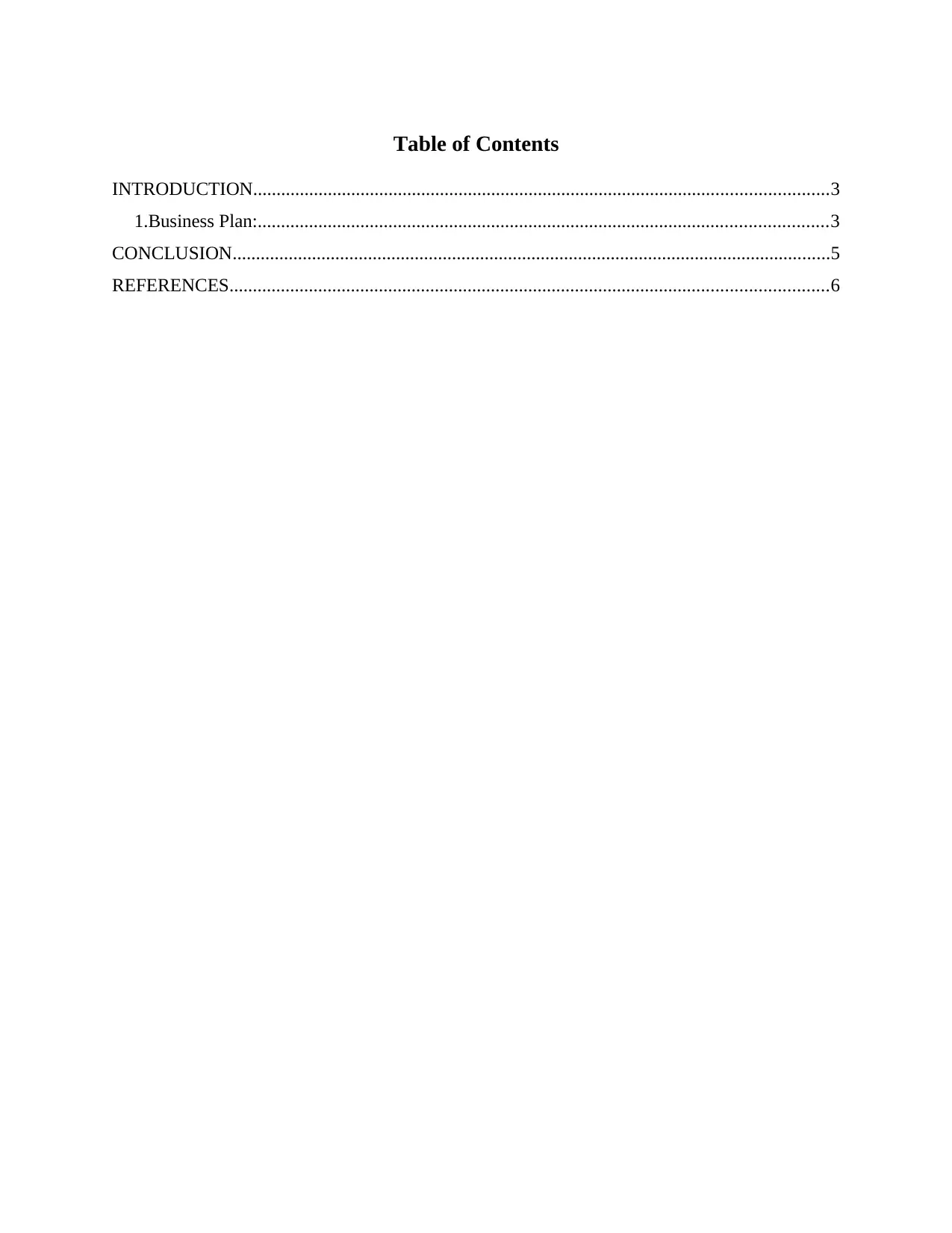
Table of Contents
INTRODUCTION...........................................................................................................................3
1.Business Plan:..........................................................................................................................3
CONCLUSION................................................................................................................................5
REFERENCES................................................................................................................................6
INTRODUCTION...........................................................................................................................3
1.Business Plan:..........................................................................................................................3
CONCLUSION................................................................................................................................5
REFERENCES................................................................................................................................6
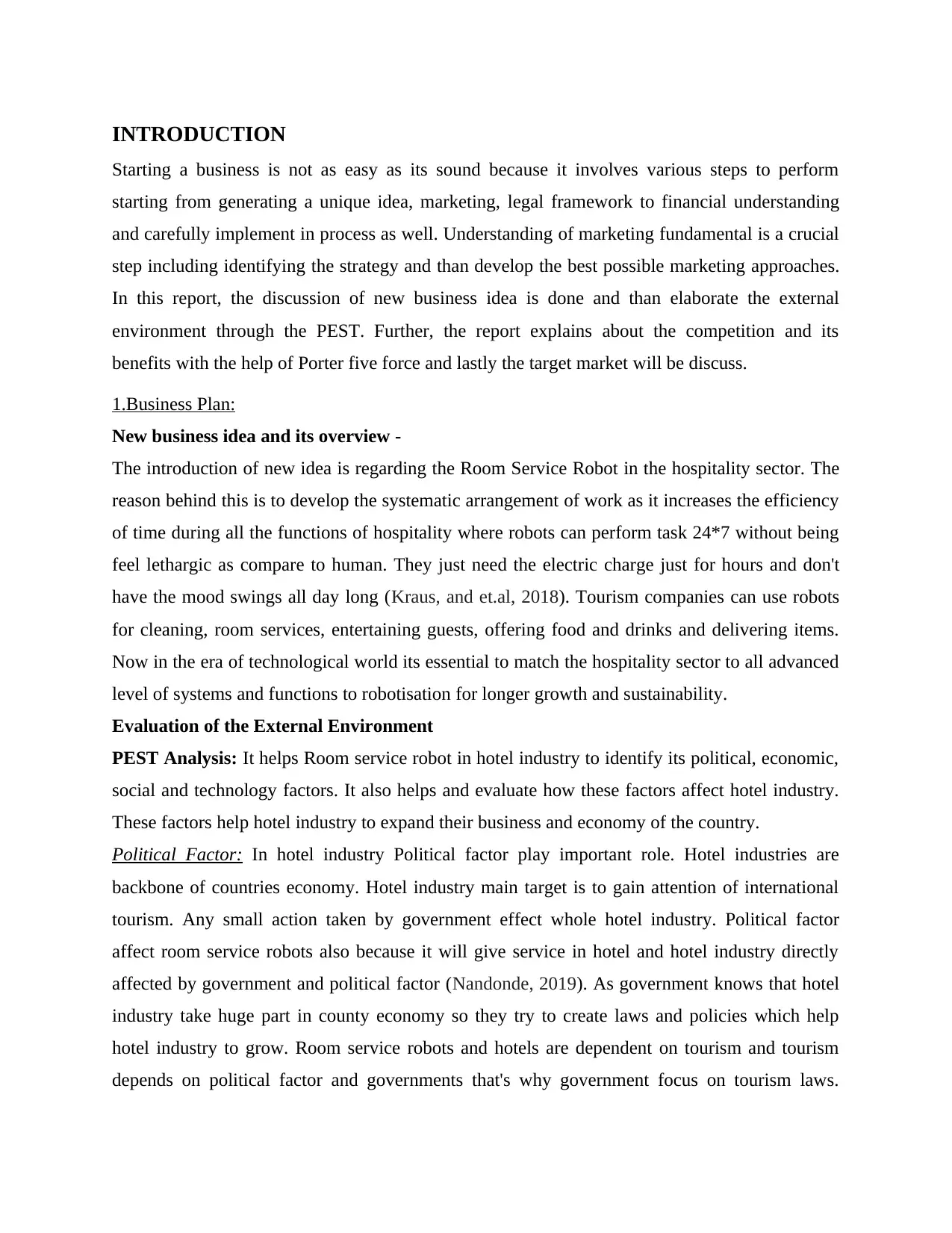
INTRODUCTION
Starting a business is not as easy as its sound because it involves various steps to perform
starting from generating a unique idea, marketing, legal framework to financial understanding
and carefully implement in process as well. Understanding of marketing fundamental is a crucial
step including identifying the strategy and than develop the best possible marketing approaches.
In this report, the discussion of new business idea is done and than elaborate the external
environment through the PEST. Further, the report explains about the competition and its
benefits with the help of Porter five force and lastly the target market will be discuss.
1.Business Plan:
New business idea and its overview -
The introduction of new idea is regarding the Room Service Robot in the hospitality sector. The
reason behind this is to develop the systematic arrangement of work as it increases the efficiency
of time during all the functions of hospitality where robots can perform task 24*7 without being
feel lethargic as compare to human. They just need the electric charge just for hours and don't
have the mood swings all day long (Kraus, and et.al, 2018). Tourism companies can use robots
for cleaning, room services, entertaining guests, offering food and drinks and delivering items.
Now in the era of technological world its essential to match the hospitality sector to all advanced
level of systems and functions to robotisation for longer growth and sustainability.
Evaluation of the External Environment
PEST Analysis: It helps Room service robot in hotel industry to identify its political, economic,
social and technology factors. It also helps and evaluate how these factors affect hotel industry.
These factors help hotel industry to expand their business and economy of the country.
Political Factor: In hotel industry Political factor play important role. Hotel industries are
backbone of countries economy. Hotel industry main target is to gain attention of international
tourism. Any small action taken by government effect whole hotel industry. Political factor
affect room service robots also because it will give service in hotel and hotel industry directly
affected by government and political factor (Nandonde, 2019). As government knows that hotel
industry take huge part in county economy so they try to create laws and policies which help
hotel industry to grow. Room service robots and hotels are dependent on tourism and tourism
depends on political factor and governments that's why government focus on tourism laws.
Starting a business is not as easy as its sound because it involves various steps to perform
starting from generating a unique idea, marketing, legal framework to financial understanding
and carefully implement in process as well. Understanding of marketing fundamental is a crucial
step including identifying the strategy and than develop the best possible marketing approaches.
In this report, the discussion of new business idea is done and than elaborate the external
environment through the PEST. Further, the report explains about the competition and its
benefits with the help of Porter five force and lastly the target market will be discuss.
1.Business Plan:
New business idea and its overview -
The introduction of new idea is regarding the Room Service Robot in the hospitality sector. The
reason behind this is to develop the systematic arrangement of work as it increases the efficiency
of time during all the functions of hospitality where robots can perform task 24*7 without being
feel lethargic as compare to human. They just need the electric charge just for hours and don't
have the mood swings all day long (Kraus, and et.al, 2018). Tourism companies can use robots
for cleaning, room services, entertaining guests, offering food and drinks and delivering items.
Now in the era of technological world its essential to match the hospitality sector to all advanced
level of systems and functions to robotisation for longer growth and sustainability.
Evaluation of the External Environment
PEST Analysis: It helps Room service robot in hotel industry to identify its political, economic,
social and technology factors. It also helps and evaluate how these factors affect hotel industry.
These factors help hotel industry to expand their business and economy of the country.
Political Factor: In hotel industry Political factor play important role. Hotel industries are
backbone of countries economy. Hotel industry main target is to gain attention of international
tourism. Any small action taken by government effect whole hotel industry. Political factor
affect room service robots also because it will give service in hotel and hotel industry directly
affected by government and political factor (Nandonde, 2019). As government knows that hotel
industry take huge part in county economy so they try to create laws and policies which help
hotel industry to grow. Room service robots and hotels are dependent on tourism and tourism
depends on political factor and governments that's why government focus on tourism laws.
⊘ This is a preview!⊘
Do you want full access?
Subscribe today to unlock all pages.

Trusted by 1+ million students worldwide
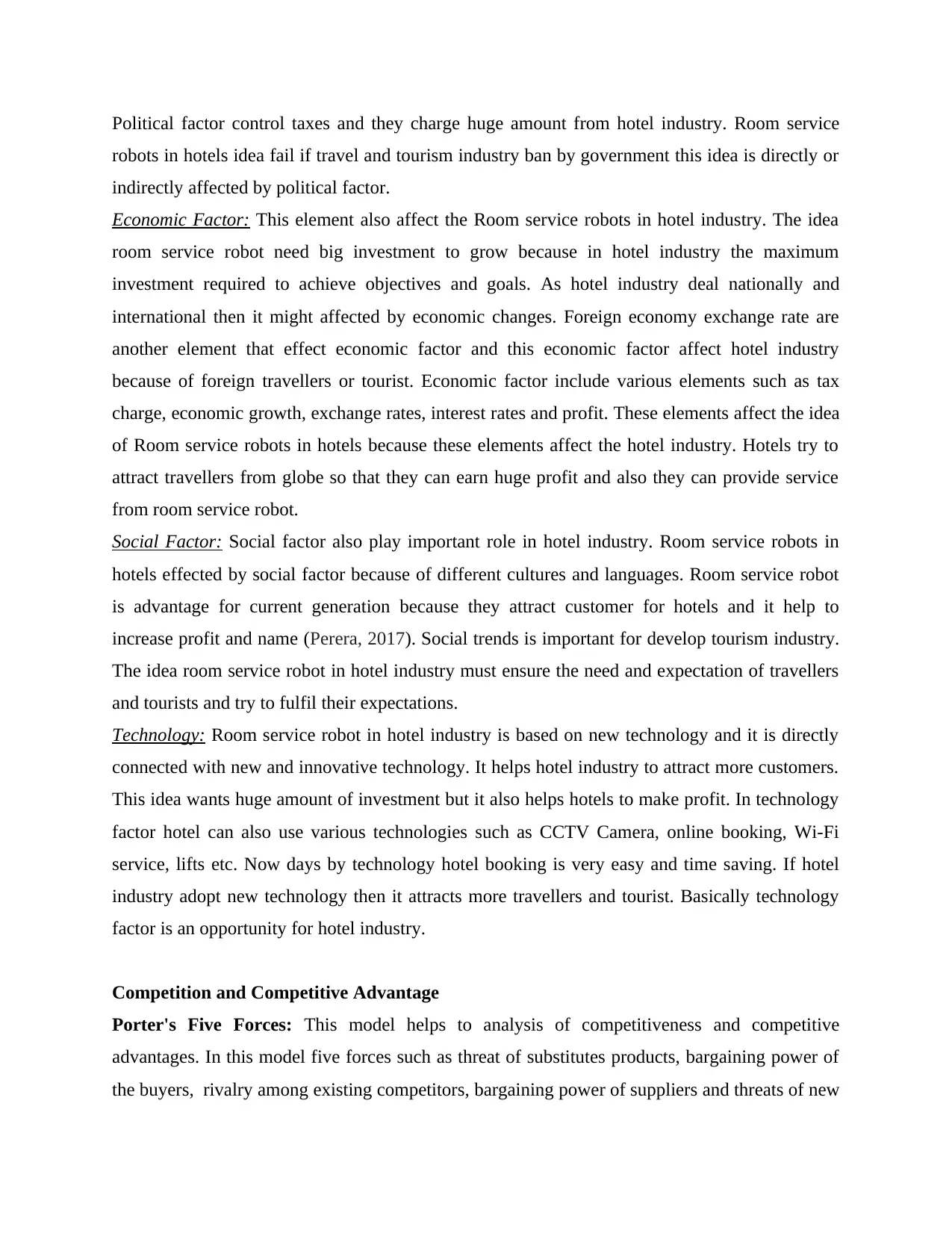
Political factor control taxes and they charge huge amount from hotel industry. Room service
robots in hotels idea fail if travel and tourism industry ban by government this idea is directly or
indirectly affected by political factor.
Economic Factor: This element also affect the Room service robots in hotel industry. The idea
room service robot need big investment to grow because in hotel industry the maximum
investment required to achieve objectives and goals. As hotel industry deal nationally and
international then it might affected by economic changes. Foreign economy exchange rate are
another element that effect economic factor and this economic factor affect hotel industry
because of foreign travellers or tourist. Economic factor include various elements such as tax
charge, economic growth, exchange rates, interest rates and profit. These elements affect the idea
of Room service robots in hotels because these elements affect the hotel industry. Hotels try to
attract travellers from globe so that they can earn huge profit and also they can provide service
from room service robot.
Social Factor: Social factor also play important role in hotel industry. Room service robots in
hotels effected by social factor because of different cultures and languages. Room service robot
is advantage for current generation because they attract customer for hotels and it help to
increase profit and name (Perera, 2017). Social trends is important for develop tourism industry.
The idea room service robot in hotel industry must ensure the need and expectation of travellers
and tourists and try to fulfil their expectations.
Technology: Room service robot in hotel industry is based on new technology and it is directly
connected with new and innovative technology. It helps hotel industry to attract more customers.
This idea wants huge amount of investment but it also helps hotels to make profit. In technology
factor hotel can also use various technologies such as CCTV Camera, online booking, Wi-Fi
service, lifts etc. Now days by technology hotel booking is very easy and time saving. If hotel
industry adopt new technology then it attracts more travellers and tourist. Basically technology
factor is an opportunity for hotel industry.
Competition and Competitive Advantage
Porter's Five Forces: This model helps to analysis of competitiveness and competitive
advantages. In this model five forces such as threat of substitutes products, bargaining power of
the buyers, rivalry among existing competitors, bargaining power of suppliers and threats of new
robots in hotels idea fail if travel and tourism industry ban by government this idea is directly or
indirectly affected by political factor.
Economic Factor: This element also affect the Room service robots in hotel industry. The idea
room service robot need big investment to grow because in hotel industry the maximum
investment required to achieve objectives and goals. As hotel industry deal nationally and
international then it might affected by economic changes. Foreign economy exchange rate are
another element that effect economic factor and this economic factor affect hotel industry
because of foreign travellers or tourist. Economic factor include various elements such as tax
charge, economic growth, exchange rates, interest rates and profit. These elements affect the idea
of Room service robots in hotels because these elements affect the hotel industry. Hotels try to
attract travellers from globe so that they can earn huge profit and also they can provide service
from room service robot.
Social Factor: Social factor also play important role in hotel industry. Room service robots in
hotels effected by social factor because of different cultures and languages. Room service robot
is advantage for current generation because they attract customer for hotels and it help to
increase profit and name (Perera, 2017). Social trends is important for develop tourism industry.
The idea room service robot in hotel industry must ensure the need and expectation of travellers
and tourists and try to fulfil their expectations.
Technology: Room service robot in hotel industry is based on new technology and it is directly
connected with new and innovative technology. It helps hotel industry to attract more customers.
This idea wants huge amount of investment but it also helps hotels to make profit. In technology
factor hotel can also use various technologies such as CCTV Camera, online booking, Wi-Fi
service, lifts etc. Now days by technology hotel booking is very easy and time saving. If hotel
industry adopt new technology then it attracts more travellers and tourist. Basically technology
factor is an opportunity for hotel industry.
Competition and Competitive Advantage
Porter's Five Forces: This model helps to analysis of competitiveness and competitive
advantages. In this model five forces such as threat of substitutes products, bargaining power of
the buyers, rivalry among existing competitors, bargaining power of suppliers and threats of new
Paraphrase This Document
Need a fresh take? Get an instant paraphrase of this document with our AI Paraphraser
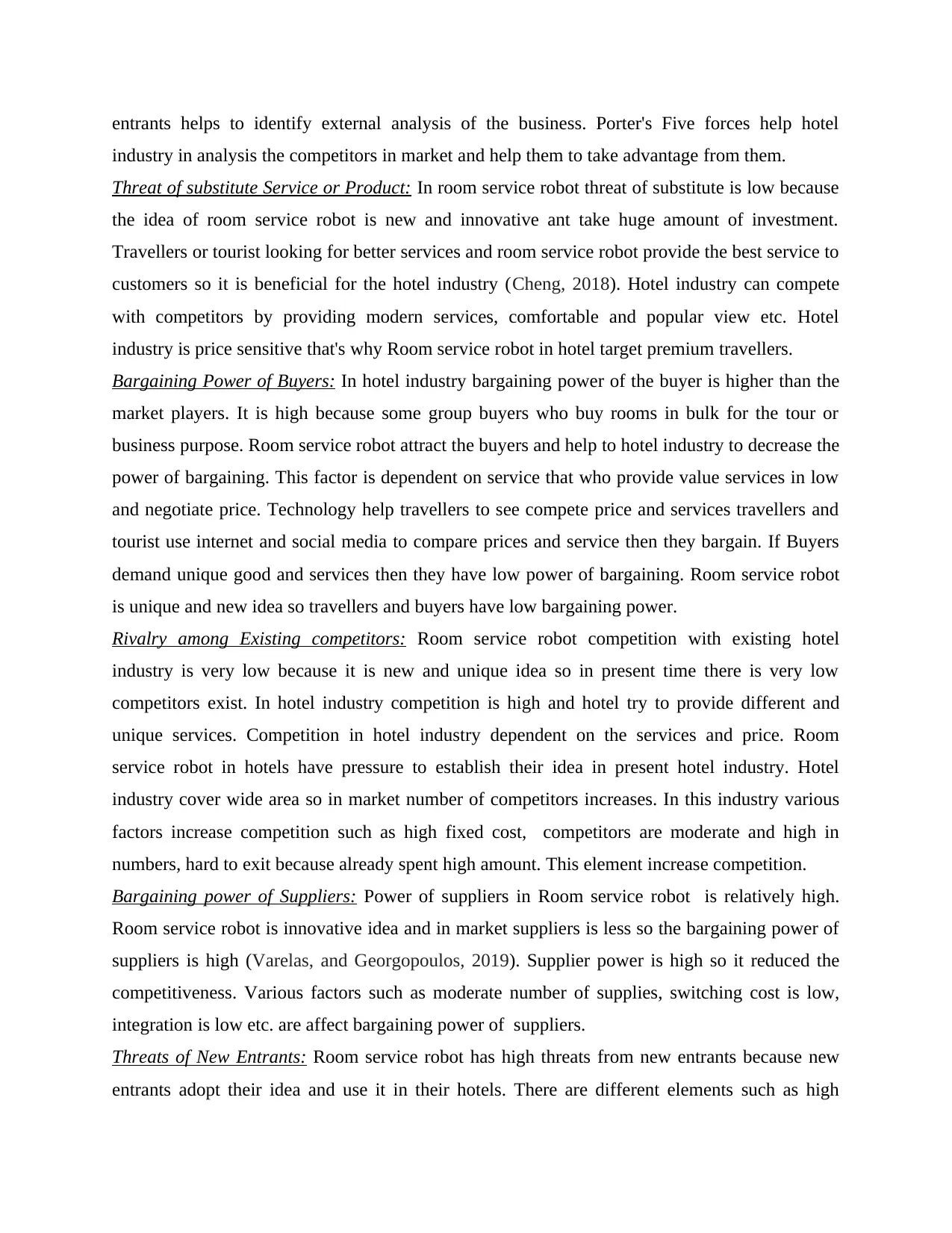
entrants helps to identify external analysis of the business. Porter's Five forces help hotel
industry in analysis the competitors in market and help them to take advantage from them.
Threat of substitute Service or Product: In room service robot threat of substitute is low because
the idea of room service robot is new and innovative ant take huge amount of investment.
Travellers or tourist looking for better services and room service robot provide the best service to
customers so it is beneficial for the hotel industry (Cheng, 2018). Hotel industry can compete
with competitors by providing modern services, comfortable and popular view etc. Hotel
industry is price sensitive that's why Room service robot in hotel target premium travellers.
Bargaining Power of Buyers: In hotel industry bargaining power of the buyer is higher than the
market players. It is high because some group buyers who buy rooms in bulk for the tour or
business purpose. Room service robot attract the buyers and help to hotel industry to decrease the
power of bargaining. This factor is dependent on service that who provide value services in low
and negotiate price. Technology help travellers to see compete price and services travellers and
tourist use internet and social media to compare prices and service then they bargain. If Buyers
demand unique good and services then they have low power of bargaining. Room service robot
is unique and new idea so travellers and buyers have low bargaining power.
Rivalry among Existing competitors: Room service robot competition with existing hotel
industry is very low because it is new and unique idea so in present time there is very low
competitors exist. In hotel industry competition is high and hotel try to provide different and
unique services. Competition in hotel industry dependent on the services and price. Room
service robot in hotels have pressure to establish their idea in present hotel industry. Hotel
industry cover wide area so in market number of competitors increases. In this industry various
factors increase competition such as high fixed cost, competitors are moderate and high in
numbers, hard to exit because already spent high amount. This element increase competition.
Bargaining power of Suppliers: Power of suppliers in Room service robot is relatively high.
Room service robot is innovative idea and in market suppliers is less so the bargaining power of
suppliers is high (Varelas, and Georgopoulos, 2019). Supplier power is high so it reduced the
competitiveness. Various factors such as moderate number of supplies, switching cost is low,
integration is low etc. are affect bargaining power of suppliers.
Threats of New Entrants: Room service robot has high threats from new entrants because new
entrants adopt their idea and use it in their hotels. There are different elements such as high
industry in analysis the competitors in market and help them to take advantage from them.
Threat of substitute Service or Product: In room service robot threat of substitute is low because
the idea of room service robot is new and innovative ant take huge amount of investment.
Travellers or tourist looking for better services and room service robot provide the best service to
customers so it is beneficial for the hotel industry (Cheng, 2018). Hotel industry can compete
with competitors by providing modern services, comfortable and popular view etc. Hotel
industry is price sensitive that's why Room service robot in hotel target premium travellers.
Bargaining Power of Buyers: In hotel industry bargaining power of the buyer is higher than the
market players. It is high because some group buyers who buy rooms in bulk for the tour or
business purpose. Room service robot attract the buyers and help to hotel industry to decrease the
power of bargaining. This factor is dependent on service that who provide value services in low
and negotiate price. Technology help travellers to see compete price and services travellers and
tourist use internet and social media to compare prices and service then they bargain. If Buyers
demand unique good and services then they have low power of bargaining. Room service robot
is unique and new idea so travellers and buyers have low bargaining power.
Rivalry among Existing competitors: Room service robot competition with existing hotel
industry is very low because it is new and unique idea so in present time there is very low
competitors exist. In hotel industry competition is high and hotel try to provide different and
unique services. Competition in hotel industry dependent on the services and price. Room
service robot in hotels have pressure to establish their idea in present hotel industry. Hotel
industry cover wide area so in market number of competitors increases. In this industry various
factors increase competition such as high fixed cost, competitors are moderate and high in
numbers, hard to exit because already spent high amount. This element increase competition.
Bargaining power of Suppliers: Power of suppliers in Room service robot is relatively high.
Room service robot is innovative idea and in market suppliers is less so the bargaining power of
suppliers is high (Varelas, and Georgopoulos, 2019). Supplier power is high so it reduced the
competitiveness. Various factors such as moderate number of supplies, switching cost is low,
integration is low etc. are affect bargaining power of suppliers.
Threats of New Entrants: Room service robot has high threats from new entrants because new
entrants adopt their idea and use it in their hotels. There are different elements such as high
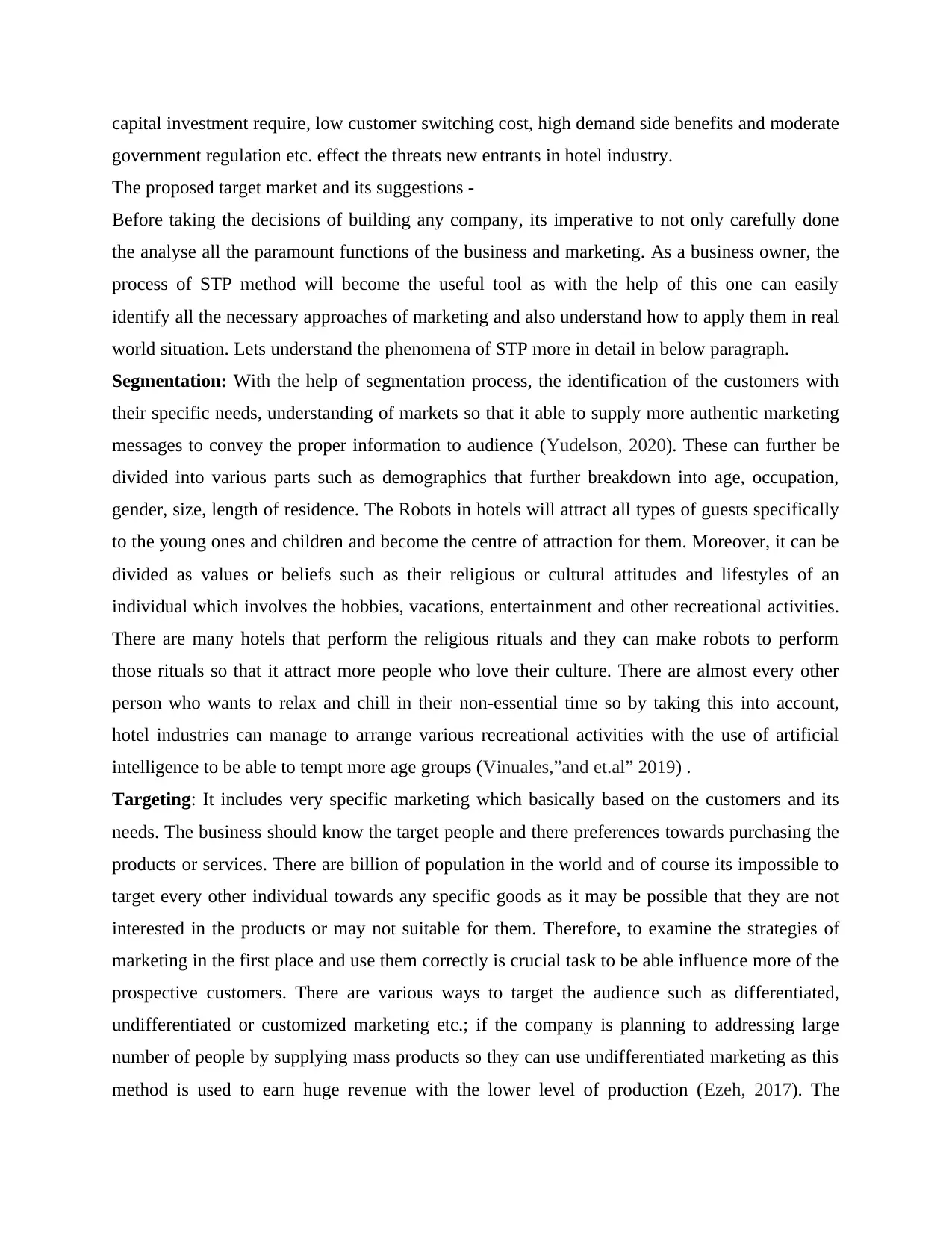
capital investment require, low customer switching cost, high demand side benefits and moderate
government regulation etc. effect the threats new entrants in hotel industry.
The proposed target market and its suggestions -
Before taking the decisions of building any company, its imperative to not only carefully done
the analyse all the paramount functions of the business and marketing. As a business owner, the
process of STP method will become the useful tool as with the help of this one can easily
identify all the necessary approaches of marketing and also understand how to apply them in real
world situation. Lets understand the phenomena of STP more in detail in below paragraph.
Segmentation: With the help of segmentation process, the identification of the customers with
their specific needs, understanding of markets so that it able to supply more authentic marketing
messages to convey the proper information to audience (Yudelson, 2020). These can further be
divided into various parts such as demographics that further breakdown into age, occupation,
gender, size, length of residence. The Robots in hotels will attract all types of guests specifically
to the young ones and children and become the centre of attraction for them. Moreover, it can be
divided as values or beliefs such as their religious or cultural attitudes and lifestyles of an
individual which involves the hobbies, vacations, entertainment and other recreational activities.
There are many hotels that perform the religious rituals and they can make robots to perform
those rituals so that it attract more people who love their culture. There are almost every other
person who wants to relax and chill in their non-essential time so by taking this into account,
hotel industries can manage to arrange various recreational activities with the use of artificial
intelligence to be able to tempt more age groups (Vinuales,”and et.al” 2019) .
Targeting: It includes very specific marketing which basically based on the customers and its
needs. The business should know the target people and there preferences towards purchasing the
products or services. There are billion of population in the world and of course its impossible to
target every other individual towards any specific goods as it may be possible that they are not
interested in the products or may not suitable for them. Therefore, to examine the strategies of
marketing in the first place and use them correctly is crucial task to be able influence more of the
prospective customers. There are various ways to target the audience such as differentiated,
undifferentiated or customized marketing etc.; if the company is planning to addressing large
number of people by supplying mass products so they can use undifferentiated marketing as this
method is used to earn huge revenue with the lower level of production (Ezeh, 2017). The
government regulation etc. effect the threats new entrants in hotel industry.
The proposed target market and its suggestions -
Before taking the decisions of building any company, its imperative to not only carefully done
the analyse all the paramount functions of the business and marketing. As a business owner, the
process of STP method will become the useful tool as with the help of this one can easily
identify all the necessary approaches of marketing and also understand how to apply them in real
world situation. Lets understand the phenomena of STP more in detail in below paragraph.
Segmentation: With the help of segmentation process, the identification of the customers with
their specific needs, understanding of markets so that it able to supply more authentic marketing
messages to convey the proper information to audience (Yudelson, 2020). These can further be
divided into various parts such as demographics that further breakdown into age, occupation,
gender, size, length of residence. The Robots in hotels will attract all types of guests specifically
to the young ones and children and become the centre of attraction for them. Moreover, it can be
divided as values or beliefs such as their religious or cultural attitudes and lifestyles of an
individual which involves the hobbies, vacations, entertainment and other recreational activities.
There are many hotels that perform the religious rituals and they can make robots to perform
those rituals so that it attract more people who love their culture. There are almost every other
person who wants to relax and chill in their non-essential time so by taking this into account,
hotel industries can manage to arrange various recreational activities with the use of artificial
intelligence to be able to tempt more age groups (Vinuales,”and et.al” 2019) .
Targeting: It includes very specific marketing which basically based on the customers and its
needs. The business should know the target people and there preferences towards purchasing the
products or services. There are billion of population in the world and of course its impossible to
target every other individual towards any specific goods as it may be possible that they are not
interested in the products or may not suitable for them. Therefore, to examine the strategies of
marketing in the first place and use them correctly is crucial task to be able influence more of the
prospective customers. There are various ways to target the audience such as differentiated,
undifferentiated or customized marketing etc.; if the company is planning to addressing large
number of people by supplying mass products so they can use undifferentiated marketing as this
method is used to earn huge revenue with the lower level of production (Ezeh, 2017). The
⊘ This is a preview!⊘
Do you want full access?
Subscribe today to unlock all pages.

Trusted by 1+ million students worldwide
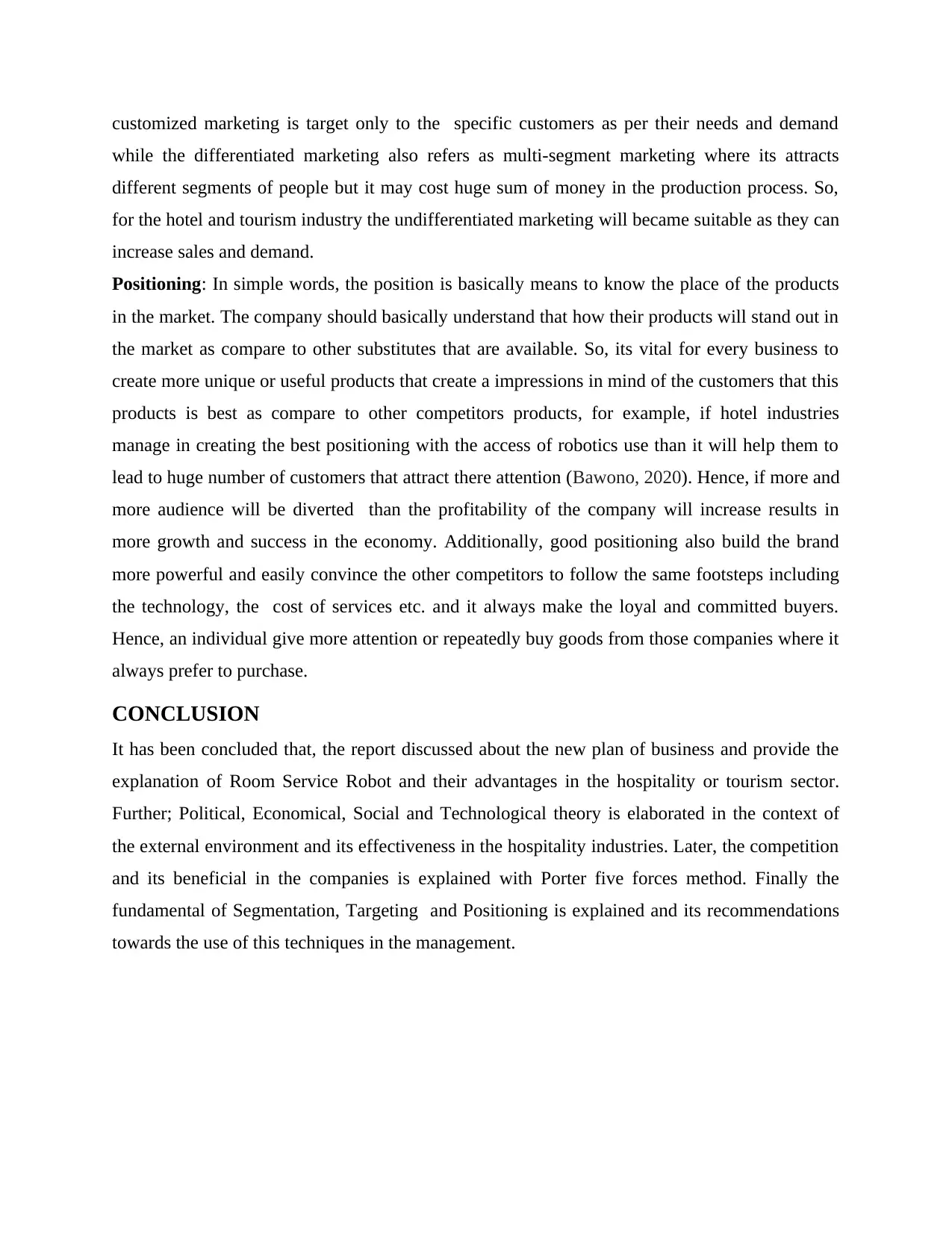
customized marketing is target only to the specific customers as per their needs and demand
while the differentiated marketing also refers as multi-segment marketing where its attracts
different segments of people but it may cost huge sum of money in the production process. So,
for the hotel and tourism industry the undifferentiated marketing will became suitable as they can
increase sales and demand.
Positioning: In simple words, the position is basically means to know the place of the products
in the market. The company should basically understand that how their products will stand out in
the market as compare to other substitutes that are available. So, its vital for every business to
create more unique or useful products that create a impressions in mind of the customers that this
products is best as compare to other competitors products, for example, if hotel industries
manage in creating the best positioning with the access of robotics use than it will help them to
lead to huge number of customers that attract there attention (Bawono, 2020). Hence, if more and
more audience will be diverted than the profitability of the company will increase results in
more growth and success in the economy. Additionally, good positioning also build the brand
more powerful and easily convince the other competitors to follow the same footsteps including
the technology, the cost of services etc. and it always make the loyal and committed buyers.
Hence, an individual give more attention or repeatedly buy goods from those companies where it
always prefer to purchase.
CONCLUSION
It has been concluded that, the report discussed about the new plan of business and provide the
explanation of Room Service Robot and their advantages in the hospitality or tourism sector.
Further; Political, Economical, Social and Technological theory is elaborated in the context of
the external environment and its effectiveness in the hospitality industries. Later, the competition
and its beneficial in the companies is explained with Porter five forces method. Finally the
fundamental of Segmentation, Targeting and Positioning is explained and its recommendations
towards the use of this techniques in the management.
while the differentiated marketing also refers as multi-segment marketing where its attracts
different segments of people but it may cost huge sum of money in the production process. So,
for the hotel and tourism industry the undifferentiated marketing will became suitable as they can
increase sales and demand.
Positioning: In simple words, the position is basically means to know the place of the products
in the market. The company should basically understand that how their products will stand out in
the market as compare to other substitutes that are available. So, its vital for every business to
create more unique or useful products that create a impressions in mind of the customers that this
products is best as compare to other competitors products, for example, if hotel industries
manage in creating the best positioning with the access of robotics use than it will help them to
lead to huge number of customers that attract there attention (Bawono, 2020). Hence, if more and
more audience will be diverted than the profitability of the company will increase results in
more growth and success in the economy. Additionally, good positioning also build the brand
more powerful and easily convince the other competitors to follow the same footsteps including
the technology, the cost of services etc. and it always make the loyal and committed buyers.
Hence, an individual give more attention or repeatedly buy goods from those companies where it
always prefer to purchase.
CONCLUSION
It has been concluded that, the report discussed about the new plan of business and provide the
explanation of Room Service Robot and their advantages in the hospitality or tourism sector.
Further; Political, Economical, Social and Technological theory is elaborated in the context of
the external environment and its effectiveness in the hospitality industries. Later, the competition
and its beneficial in the companies is explained with Porter five forces method. Finally the
fundamental of Segmentation, Targeting and Positioning is explained and its recommendations
towards the use of this techniques in the management.
Paraphrase This Document
Need a fresh take? Get an instant paraphrase of this document with our AI Paraphraser
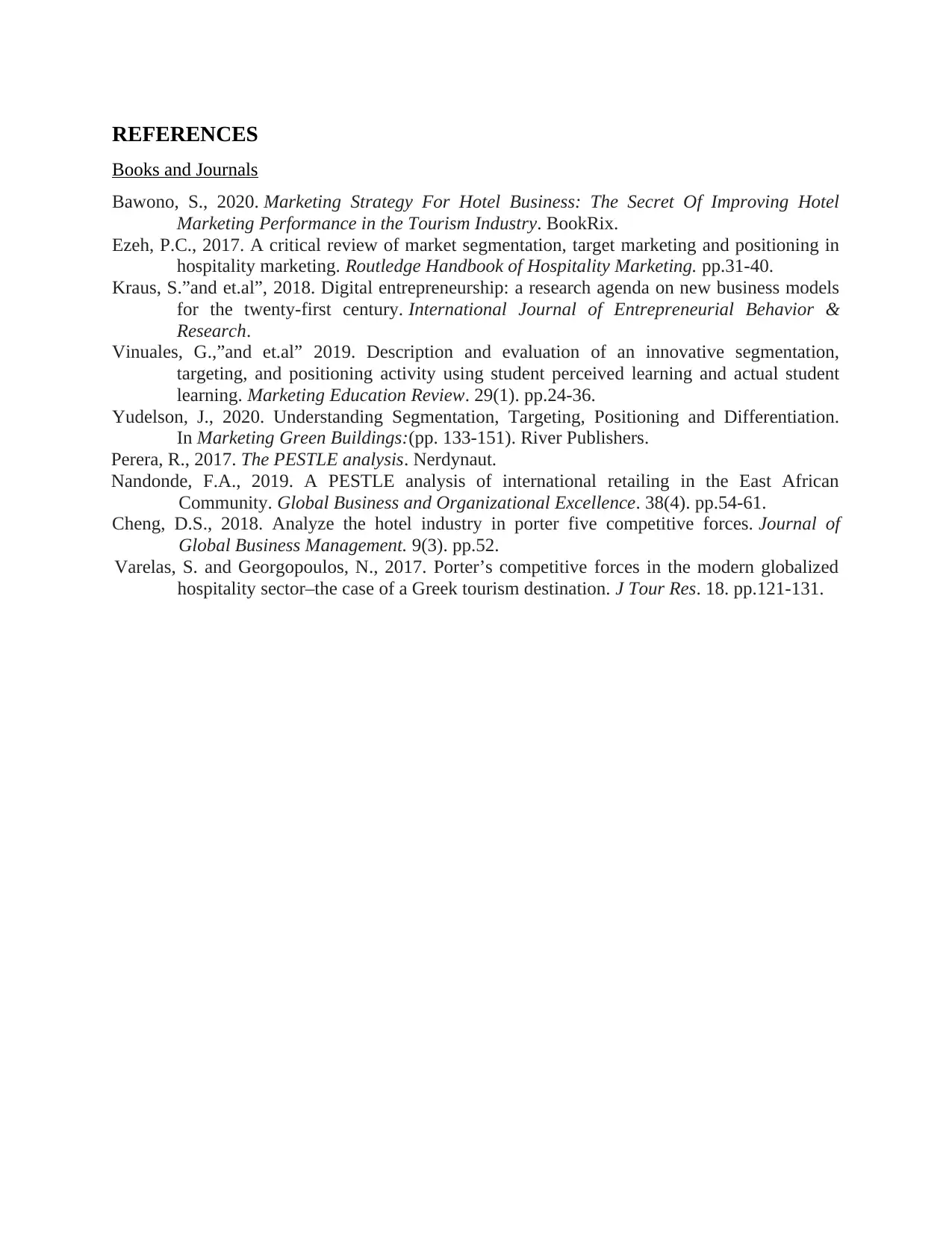
REFERENCES
Books and Journals
Bawono, S., 2020. Marketing Strategy For Hotel Business: The Secret Of Improving Hotel
Marketing Performance in the Tourism Industry. BookRix.
Ezeh, P.C., 2017. A critical review of market segmentation, target marketing and positioning in
hospitality marketing. Routledge Handbook of Hospitality Marketing. pp.31-40.
Kraus, S.”and et.al”, 2018. Digital entrepreneurship: a research agenda on new business models
for the twenty-first century. International Journal of Entrepreneurial Behavior &
Research.
Vinuales, G.,”and et.al” 2019. Description and evaluation of an innovative segmentation,
targeting, and positioning activity using student perceived learning and actual student
learning. Marketing Education Review. 29(1). pp.24-36.
Yudelson, J., 2020. Understanding Segmentation, Targeting, Positioning and Differentiation.
In Marketing Green Buildings:(pp. 133-151). River Publishers.
Perera, R., 2017. The PESTLE analysis. Nerdynaut.
Nandonde, F.A., 2019. A PESTLE analysis of international retailing in the East African
Community. Global Business and Organizational Excellence. 38(4). pp.54-61.
Cheng, D.S., 2018. Analyze the hotel industry in porter five competitive forces. Journal of
Global Business Management. 9(3). pp.52.
Varelas, S. and Georgopoulos, N., 2017. Porter’s competitive forces in the modern globalized
hospitality sector–the case of a Greek tourism destination. J Tour Res. 18. pp.121-131.
Books and Journals
Bawono, S., 2020. Marketing Strategy For Hotel Business: The Secret Of Improving Hotel
Marketing Performance in the Tourism Industry. BookRix.
Ezeh, P.C., 2017. A critical review of market segmentation, target marketing and positioning in
hospitality marketing. Routledge Handbook of Hospitality Marketing. pp.31-40.
Kraus, S.”and et.al”, 2018. Digital entrepreneurship: a research agenda on new business models
for the twenty-first century. International Journal of Entrepreneurial Behavior &
Research.
Vinuales, G.,”and et.al” 2019. Description and evaluation of an innovative segmentation,
targeting, and positioning activity using student perceived learning and actual student
learning. Marketing Education Review. 29(1). pp.24-36.
Yudelson, J., 2020. Understanding Segmentation, Targeting, Positioning and Differentiation.
In Marketing Green Buildings:(pp. 133-151). River Publishers.
Perera, R., 2017. The PESTLE analysis. Nerdynaut.
Nandonde, F.A., 2019. A PESTLE analysis of international retailing in the East African
Community. Global Business and Organizational Excellence. 38(4). pp.54-61.
Cheng, D.S., 2018. Analyze the hotel industry in porter five competitive forces. Journal of
Global Business Management. 9(3). pp.52.
Varelas, S. and Georgopoulos, N., 2017. Porter’s competitive forces in the modern globalized
hospitality sector–the case of a Greek tourism destination. J Tour Res. 18. pp.121-131.
1 out of 8
Related Documents
Your All-in-One AI-Powered Toolkit for Academic Success.
+13062052269
info@desklib.com
Available 24*7 on WhatsApp / Email
![[object Object]](/_next/static/media/star-bottom.7253800d.svg)
Unlock your academic potential
Copyright © 2020–2026 A2Z Services. All Rights Reserved. Developed and managed by ZUCOL.




